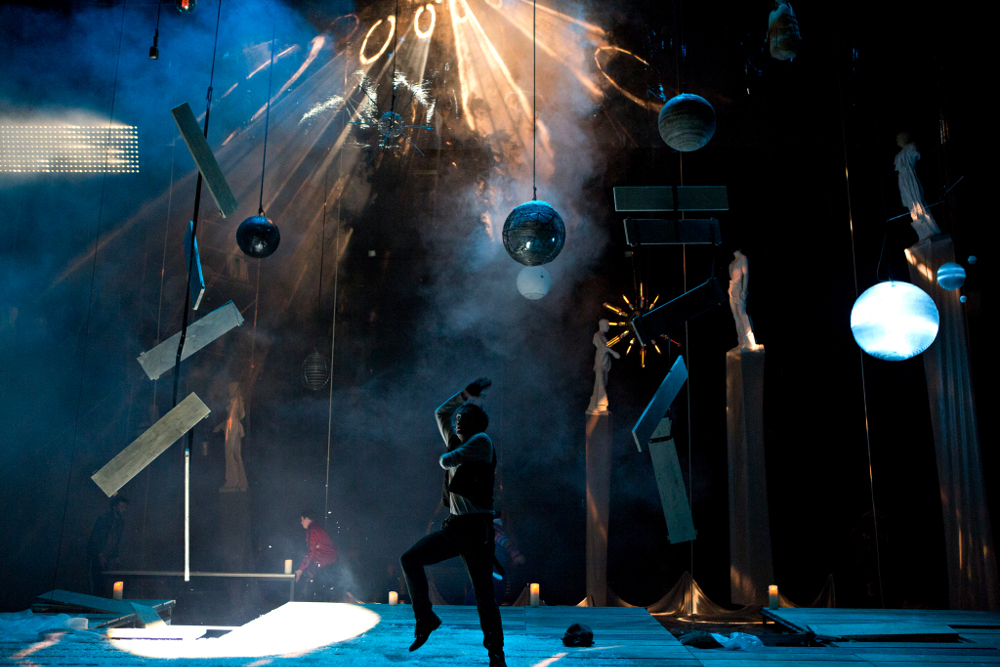After Tartuffe, Don Juan. With Tartuffe, Molière had, in the words of Jean-François Sivadier “gone too far”; with Don Juan, he goes further still. In this new stroke of daring, Molière invents his own version of one of Western literature’s final myths. Don Juan, along with Hamlet, and Faust, ranks amongst modernity’s major inaugural figures. He enters headlong into it, the piece striding ahead on these “two legs” - pillars - of “laughter and dread”. His century is the one begun by Galileo, another of the director’s heroes. From that moment on, faith was no longer to be a matter of bowing down to a spiritual or temporal authority, but the domain of reason and rationalism. Our very existence no longer had to conform to the commandments of any Commander: it was there to be explored, in all directions. Superstitious credulity, that conditioned response of the most basic kind, found itself being replaced by the free spirit of libertine enquiry. Don Juan lends himself to it with an extraordinary sense of insolence, delectation and jubilation. Within this romanesque, mercurial and eventful piece, this “world trip” is more like “a trip around himself”, around an individual who has resolved to “try to tire out the world around him, and himself in the process, in order to feel alive”. The Don Juan played by Nicolas Bouchaud, one of Sivadier’s loyal stage companions, is that of an uproariously romanesque improvisor who sweeps aside convention of all sort, from the ethical to the aesthetic. Laws are binding, yes, but it is only consenting victims that are bound by them. Don Juan’s pledge is to a pared-down world, of infinite variation. A journey with no bounds, and no prospect of return (indeed, the one time he keeps his word, a handshake proves fateful). Never mind about the others.
Don Juan, the rapist. Don Juan, the seducer. Fleer or fighter. Coward, brave, subtle, brutal, criminal - even, nothing matters to him. He knows no fear, and does not even know the meaning of the words contradiction or ridicule. What matters is to be yourself, and true to yourself. Hypocrisy, which he stumbles upon towards the end of his journey, is just one more in his vast panoply of weapons. So, why should he be sincere to anyone else? Duty is a form of debt, and Don Juan does not feel indebted to anyone. We are made to think of the eternal illusion of fathers who believe that their sons owe them something; the age-old naivety of creditors and their belief that their debtors are obliged to pay them back; or the undying stupidity of servants who believe that their masters will settle up unpaid wages before the final curtain. And what about those all those poor wives who put their trust in their husbands and their great promises?
The Don Juan that Sivadier brings us, somewhere between juggler, actor and player, is a “physical projection space open to all interpretations”. There is something of the clown about him as well, for “comedy always springs from the unfortunate meeting of theory and practice”. With the stage turned into an “arena” in which all the various bouts of his life are played out before he meets his death, Don Juan would be beholden to nobody if it were not for the statue of the Commander at the end of the road. But it is by no means sure that the mastery of the “Stone Guest” over this devil-like figure is complete. For the fire of damnation consumes Don Juan, but does not erase the words he has spoken... And the infernal theatrical machine of Sivadier and his “trusty band” will be there to fan the flames – in the present, night after night.
Cast
artistic collaboration Nicolas Bouchaud, Véronique Timsit
scenography Daniel Jeanneteau, Jean-François Sivadier, Christian Tirole
lights Philippe Berthomé
costumes Virginie Gervaise
make-up, hair Cécile Kretschmar
sound Eve-Anne Joalland
production déléguée Théâtre National de Bretagne – Rennes
coproduction Compagnie Italienne avec Orchestre, Odéon-Théâtre de l’Europe, MC2: Grenoble, Châteauvallon – Scène Nationale, Le Grand T – Théâtre de Loire-Atlantique, Printemps des Comédiens – Montpellier
length 2h30
avec le soutien du Cercle de l’Odéon




